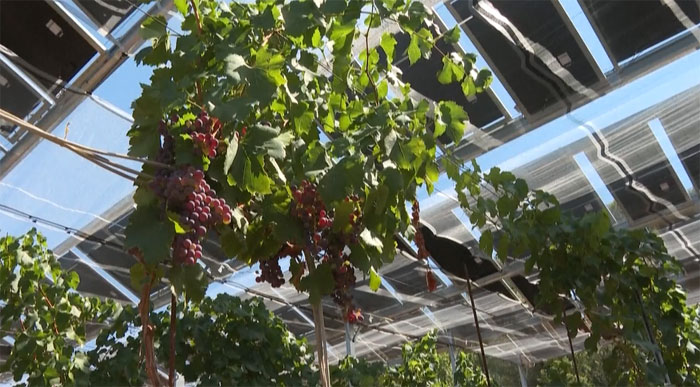France is using mobile solar panels to generate electricity and provide shade for fruit orchards, helping crops cope with the heat.
Extreme weather poses a threat to agriculture. Crop yields are predicted to decline in most production areas worldwide over the coming decades without adaptation measures, according to a report by the climate change research organization MedECC.

As a “victim” of global warming, farmers in the Mediterranean basin of France—where temperatures are rising 20% faster than the rest of the world—are experimenting with a new cultivation model, using solar panels as mobile canopies that generate clean electricity while helping crops thrive in hot, dry conditions.
“Just like we use umbrellas for shade, the shade from the solar panels will protect the vines from most extreme heat waves. This allows them to grow normally and reduces evaporation, meaning the vines have reserves to complete their cycle,” shared grape grower Gautier Hugues in Var, Provence-Alpes-Côte d’Azur, southern France.
Fruit orchards with mobile solar panel canopies in France. (Video: AFP)
However, shade is not always beneficial for crops. “If you provide shade when the plants don’t need it, that can be disastrous,” noted gardener Christian Davico-Pahin.
Therefore, the solar canopies need to be designed to be mobile. The company Ombrea, founded by Davico-Pahin, has developed sensors that measure humidity, wind speed, light, and soil conditions in the vineyards. Every 15 to 20 seconds, they send data to software for analysis and remotely control the movement of the canopies, creating an ideal microclimate.
The electricity generated by the panels will be sold to the local grid, helping to offset some of the installation costs.
Also in Provence-Alpes-Côte d’Azur, one of the centers for apple and pear production in France, the La Pugère agricultural research station is testing mobile canopies over a 700 m² apple orchard in collaboration with the energy company Sun’R.
“During periods of intense heat, the canopy helps reduce temperatures by up to 4°C on the foliage, thereby decreasing the risk of sunburn on leaves and fruit,” said researcher Vincent Lesniak at La Pugère.
However, as mobile canopies limit evaporation and reduce irrigation needs, adding moisture can sometimes increase the risk of fungal diseases. Experts are not yet certain about all the benefits of this new cultivation method, so this model needs to be tested and monitored for several years before scaling up.


















































